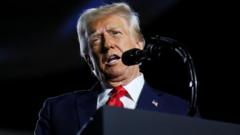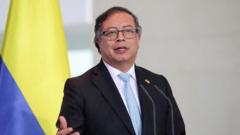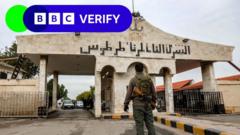Italy's decision to arrest and then swiftly release a Libyan prison director linked to severe human rights abuses has ignited significant backlash from international bodies and human rights advocates, questioning the nation's appeal to Libya amid a migration crisis.
Italy's Controversial Release of Libyan War Crimes Suspect Sparks Outrage

Italy's Controversial Release of Libyan War Crimes Suspect Sparks Outrage
Critics blast Italian government for releasing Osama Elmasry Njeem, citing political motivations tied to migration control.
In a surprising turn of events, Italian police arrested Osama Elmasry Njeem, a man wanted by the International Criminal Court for alleged crimes against humanity, during a routine check-in at a Holiday Inn in Turin. Njeem, known for his leadership of Libyan prisons notorious for torture and abuse, faced a warrant detailing accusations of murder, torture, and sexual violence.
However, just two days post-arrest, Njeem was released and flown back to Libya, raising eyebrows and ire among global and domestic observers. Human rights groups expressed alarm, while political opposition within Italy accused Prime Minister Giorgia Meloni's administration of prioritizing diplomatic relations over justice, given Italy's reliance on Libya to manage the inflow of migrants crossing the Mediterranean.
Critics, including opposition parliament members, asserted that sending Njeem back to Libya was strategically detrimental, accusing the government of betraying humanitarian commitments for political leverage. Peppe De Cristoforo, a vocal opposition lawmaker, asserted in Parliament that backing Libya's authorities compromised Italy's moral responsibilities.
In defense of their actions, officials from Meloni’s government pointed to procedural errors in Njeem's arrest, claiming he had been detained without the necessary prior authorization from the justice ministry, thus rendering the arrest invalid. Despite this, the government's narrative has been met with skepticism as global human rights watchdogs and the International Criminal Court registered their discontent at the release of a supposedly dangerous individual.
As the controversy unfolds, the situation raises critical questions about the intersection of international law, humanitarian obligations, and the realpolitik of managing immigration flows in Europe. The fallout from this incident may affect Italy’s diplomatic stance with both Libya and the international community, as the government contends with the implications of its recent actions in the face of growing scrutiny.
However, just two days post-arrest, Njeem was released and flown back to Libya, raising eyebrows and ire among global and domestic observers. Human rights groups expressed alarm, while political opposition within Italy accused Prime Minister Giorgia Meloni's administration of prioritizing diplomatic relations over justice, given Italy's reliance on Libya to manage the inflow of migrants crossing the Mediterranean.
Critics, including opposition parliament members, asserted that sending Njeem back to Libya was strategically detrimental, accusing the government of betraying humanitarian commitments for political leverage. Peppe De Cristoforo, a vocal opposition lawmaker, asserted in Parliament that backing Libya's authorities compromised Italy's moral responsibilities.
In defense of their actions, officials from Meloni’s government pointed to procedural errors in Njeem's arrest, claiming he had been detained without the necessary prior authorization from the justice ministry, thus rendering the arrest invalid. Despite this, the government's narrative has been met with skepticism as global human rights watchdogs and the International Criminal Court registered their discontent at the release of a supposedly dangerous individual.
As the controversy unfolds, the situation raises critical questions about the intersection of international law, humanitarian obligations, and the realpolitik of managing immigration flows in Europe. The fallout from this incident may affect Italy’s diplomatic stance with both Libya and the international community, as the government contends with the implications of its recent actions in the face of growing scrutiny.



















